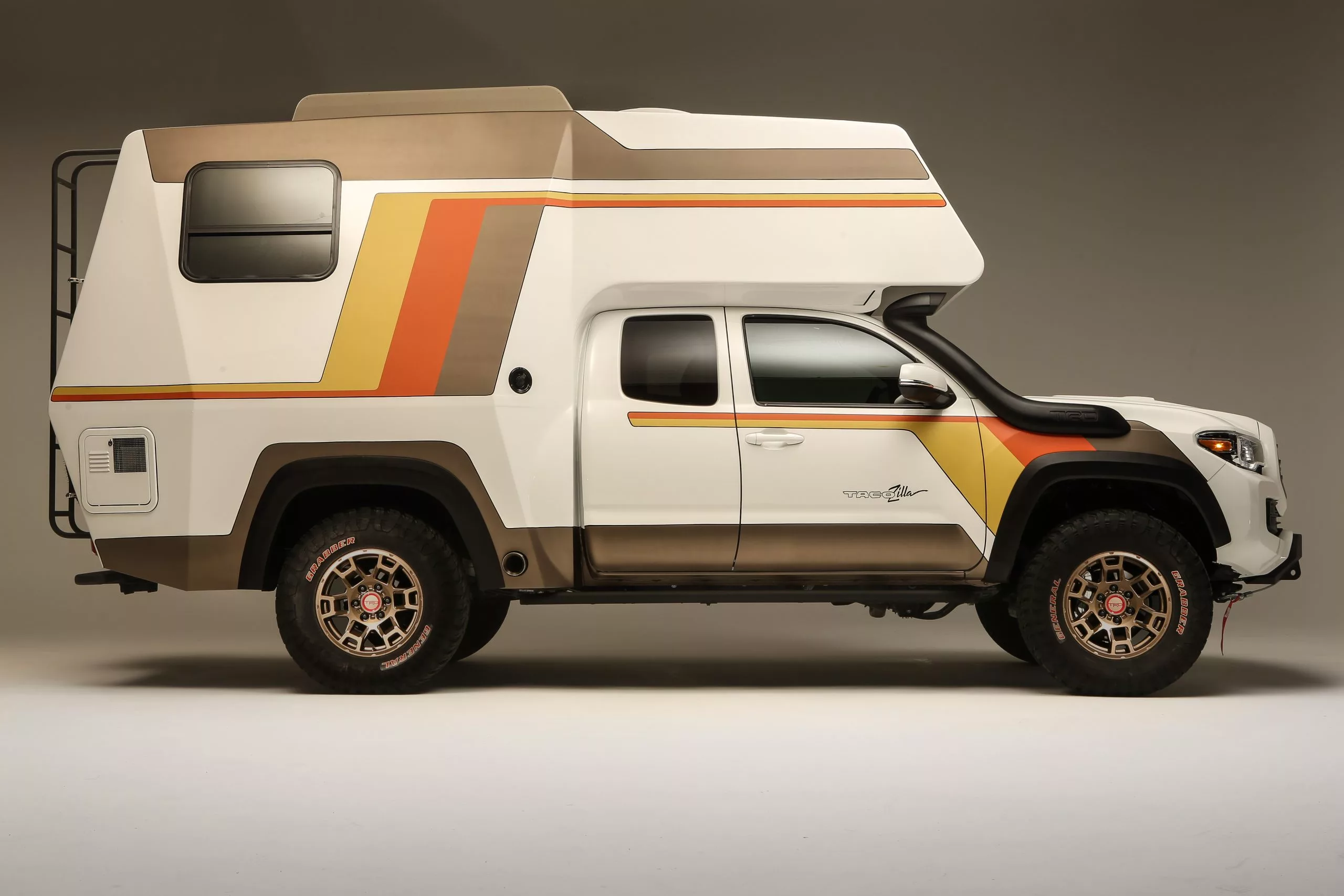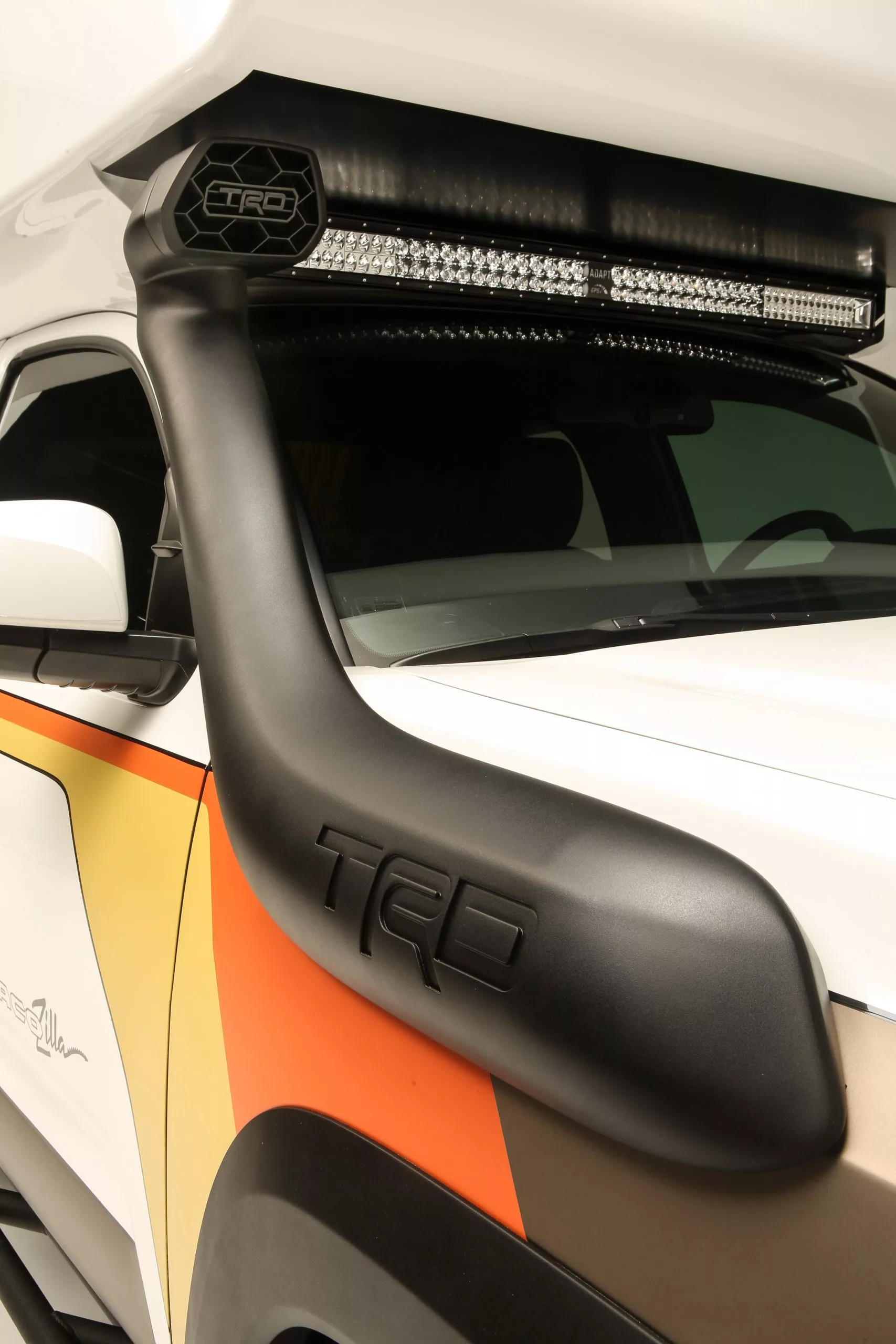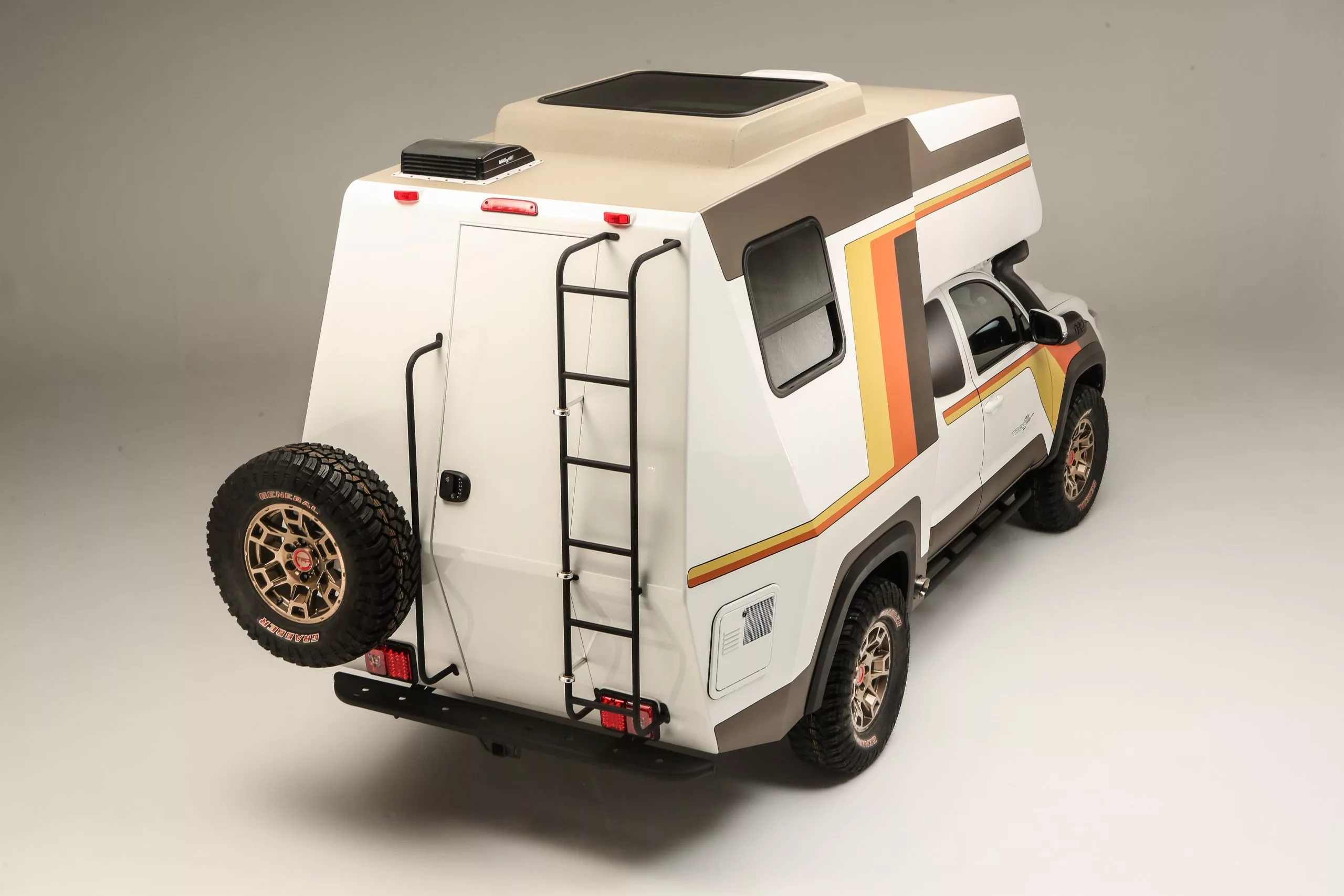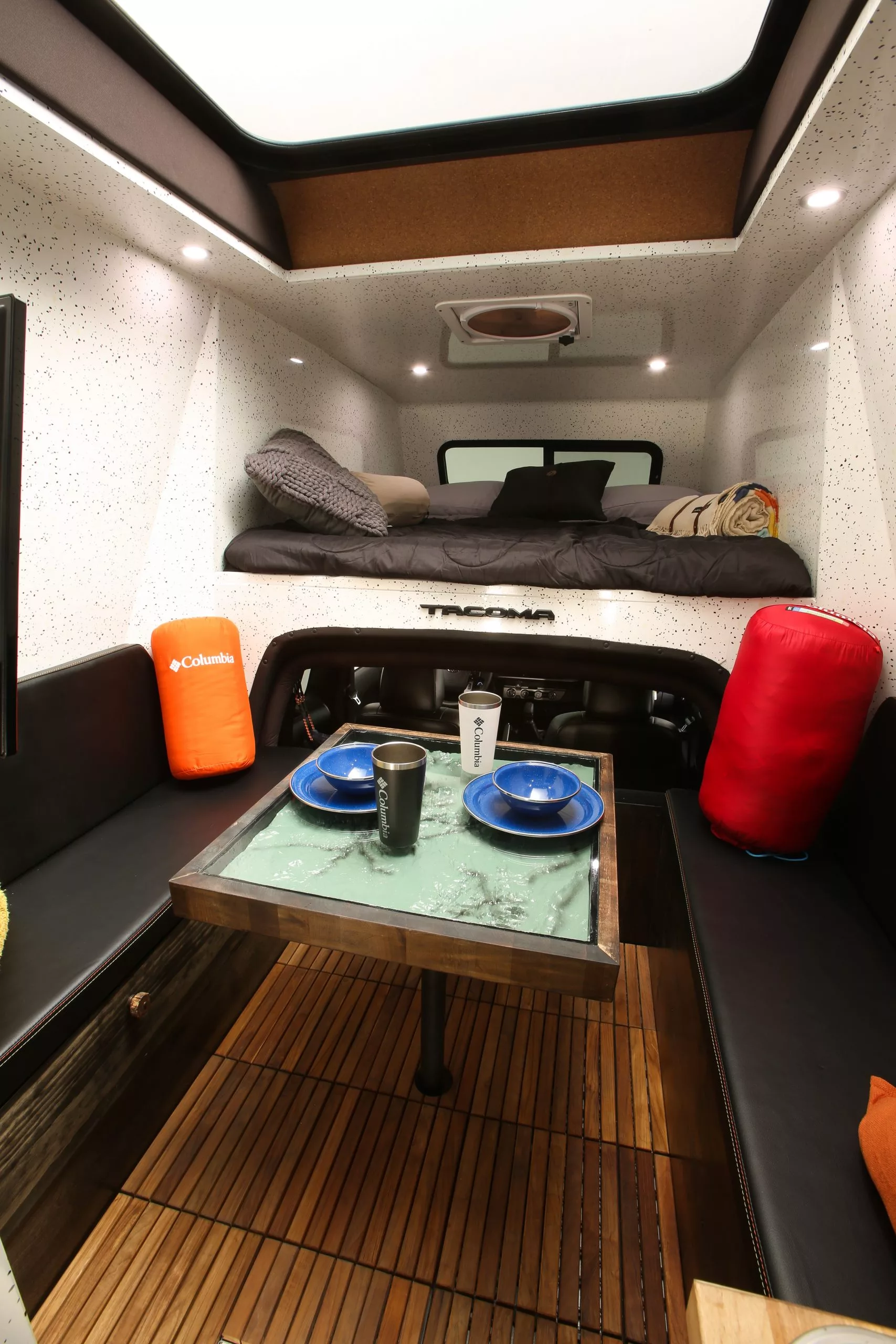Digging into its illustrious history, Toyota introduces a spiritual successor to the Toyota camper trucks of the 1970s and 80s. The brand-new Tacozilla marries a rugged Tacoma TRD Sport pickup chassis and a custom-built "micro-house" into an amazing, little 4x4 micro-RV that's precise and nimble on the trail and roomy and livable overnight. It may be but a SEMA one-off, but if there was ever a time the world needed a Toyota-badged camper capable of going "anywhere on this planet," while looking good doing it, that time is now.
Just a few months ago, overland startup TruckHouse introduced its take on a Toyota Sunrader revival, a state-of-the-art Tacoma camper truck with a gorgeous interior. As much as we admire the company's work, a US$325K fully loaded, carbon fiber masterpiece doesn't quite fit the mold of a simple, nostalgic off-road truck camper.
The Tacozilla fits the mold quite nicely, helped right along by its beautifully retro golden-tan/orange/bronze striped paint job and, of course, the fact that Toyota doesn't actually have to create a viable price point for the SEMA one-off, leaving us to imagine strolling into the local Toyota dealership and picking a spartan base model up for little more than a nicely equipped Tacoma pickup.
The Tacozilla isn't inspired so much by the Sunrader but another much-loved Toyota micro-RV from decades' past, the Chinook. According to Tin Can Tourists, Toyota and Chinook partnered on their first small, efficient Hilux pickup-based fiberglass mini-motorhomes in 1973, against the backdrop of a looming US oil crisis. A very far cry from TruckHouse's $325K, the first Toyota-Chinook models retailed for under $5,000, which falls below $31,000 in 2021 money. In fact, advertisements at the time encouraged buyers to "buy an economy car; get a camper free."

Toyota's high, hard-roofed Tacozilla appears to be most closely influenced by the Chinook Newport/Omega that followed the earlier pop-top models. In addition to a similar roof, the Tacozilla shares an angled-sidewall design with the Newport and Omega campers.
Toyota's Tacozilla team started off with a Tacoma TRD Sport Access Cab. The idea was never to simply slide a camper into the bed or bolt one to the bare chassis but to create an off-road mini-RV capable of handling the same type of trails the Tacoma TRD Sport handles. It also had to be cool and flashy enough to spark its own buzz at a show dedicated to outrageous automotive artistry.

"Our goal was to build a vehicle that is engineered correctly but also made to look really cool," explains project manager Marty Schwerter, director of operations at Toyota's Motorsports Technical Center. "Being around race cars my whole life, race cars are cool-looking. I want campers to be cool-looking, too.”
After sketching out a design and removing the Tacoma's bed, Schwerter and team began to frame out the camper with square tubing. Life would have been easier without the "cool-looking" ambition, but the team developed a design with rounded edges and multi-planar sidewalls that angle out to a crease visually connected to the lower window edge on the truck cab, just like the Newport.
This angled-wall design proved a particular challenge at the rear-end, where the team put more than 100 hours of labor into creating a single-piece door that fits precisely inside the frame and opens and closes with ease (Chinook sidestepped this problem with a dual-piece split side door).

When it came time to finish the aluminum body, Toyota reached out to Texas-based Complete Customs, which splashed on the magnificent multicolor retro sheen and also helped assemble and appoint the interior. Here, Toyota squeezed in a compact but highly functional floor plan that begins just inside the doorway with a kitchen block and fully enclosed wet bathroom across from each other. The bathroom has a toilet and hot/cold shower, while the kitchen has the familiar combination of stove, sink and fridge/freezer.
Stepping farther inside, the Tacozilla camper invites R&R on a dual-bench dining lounge with a gorgeous 3D-printed table that doubles as backlit wall art. That's a cool, little feature, but it reminds us of the sad reality that this is just a one-off show camper – if it were a product, the table would double as a sleeping surface, not artwork, ensuring a Double Cab Tacozilla could be used as a family camper. Instead, the Tacozilla is a dedicated two-sleeper with multifunctional table art.
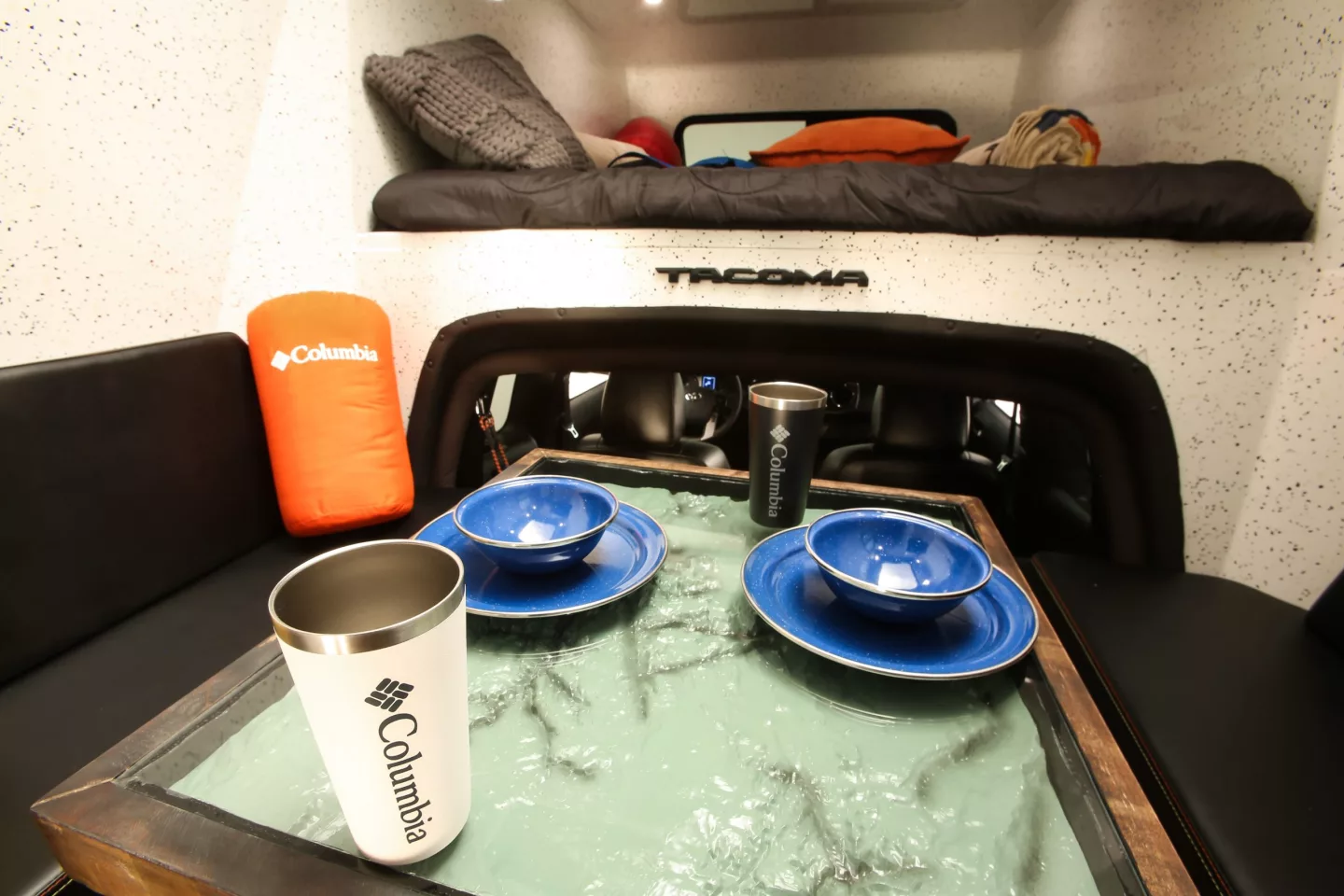
The Tacozilla bed is up in the alcove, where campers can maintain a view of the wall-mounted TV they were watching in the lounge. If it's a clear night, though, they'll want to flip the TV off and turn their attention to the star show playing out within the 4 x 4-foot (1.2 x 1.2-m) skylight centered on the ceiling.
The Tacozilla team didn't expend too much extra energy overhauling the Tacoma itself, adding a modest list of upgrades like a TRD snorkel, front winch, 2-in suspension lift and TRD billet upper control arms, General Grabber X3 285/70/17 tires, and Rigid auxiliary lighting. Drive power comes from the Tacoma's 278-hp 3.5-liter V6 and six-speed manual, and a dual-battery setup under the hood ensures there's enough power for the vehicle, camper equipment and add-on lighting.

Needless to say, this SEMA one-off won't be following the historical footsteps of the original Toyota Chinooks to Toyota dealers, but we're certain many SEMA show goers and followers are wishing it would. RVing and overlanding were already popular before the pandemic and now that that popularity has risen to feverish heights, RVs of all styles and sizes are coveted commodities. Put an attractive price on a neatly integrated 4x4 camper built on America's favorite overlanding truck and badged with Toyota reliability and watch it backorder for years to come.
For a closer look at the build process and some of the decisions that went into it, check out the four-part Tacozilla series on Toyota USA's YouTube channel. Part 1 is below.
Source: Toyota


